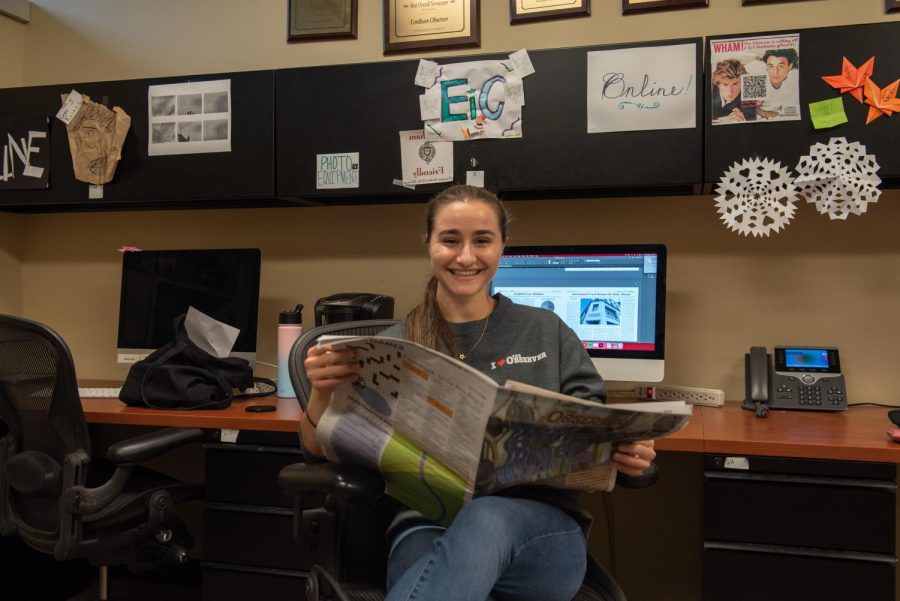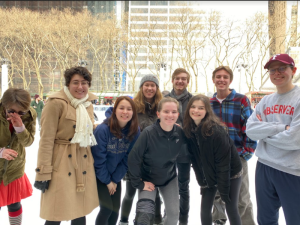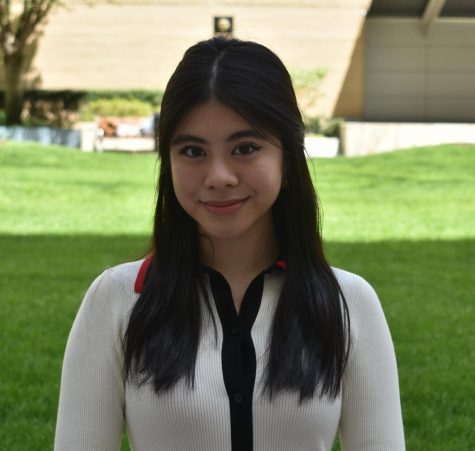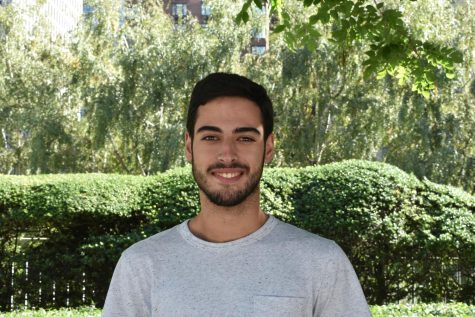Bearer of Good News: A Profile on Katrina Lambert
The Observer’s former editor-in-chief reflects on her time in leadership and the legacy she hopes to leave behind
Katrina Lambert, former Observer editor-in-chief, sits at her old desk with a copy of the Bronx special issue.
May 4, 2022
For The Observer’s editorial board, it is crunch time every other Tuesday, as editors from various sections of the paper pack into the Casey A. Feldman newsroom on what are referred to as “production nights.” The editors work Tuesday night in preparation for the next issue’s release the following morning. It is a tight turnaround, and Tuesday night is a whirlwind of activity, a comforting sort of chaos as people flit past each other conducting last-minute fact checks or looking over shoulders to tweak article layouts on Adobe InDesign.
Katrina Lambert, Fordham College at Lincoln Center (FCLC) ’22 and former editor-in-chief of The Observer, sits at the center of these nights, often found working at the desk with the glittery “Editor-in-Chief” sign tacked onto it. Every freshly printed galley passes through her hands, the pages marked in her signature turquoise-colored pen as she scans each word, determined not to let any errors slip by. She is occasionally interrupted with questions or casual conversation as the evening deepens.
The news cycle is nothing if not hectic, yet the staff keeps coming back at the same time on Tuesday when they could choose to spend their weeknight at Argo Tea, only a stone’s throw from the office. Although the unmistakable sense of urgency needed to put out an entire issue by the very next morning permeates the room, it is never suffocating. Even when production nights stretch on so late that they bleed into early morning, there is rarely a moment not interspersed with happy chatter or laughter.
“I think it is really important that people stay on The Observer because they feel like they have people they love to be around, and it makes them happy to be here.” Katrina Lambert, former editor-in-chief
“I think it is really important that people stay on The Observer because they feel like they have people they love to be around, and it makes them happy to be here,” Lambert said. “If they really wanted to, they could do news elsewhere or do their own journalism, but the people who come and who stay are the ones that find a sense of community on our paper.”
A Non-Linear Path
Lambert’s commitments while at The Observer extended beyond her position as editor-in-chief. Throughout her time at Fordham, she also interned for NBC News and was recently awarded the Journalism Award at the Lincoln Center Senior Leadership Awards.
When taking in all of these experiences, Lambert spoke about how separating herself from journalism seemed nearly impossible now, but her path to pursuing a career in the industry was far from a linear one.
To Lambert, journalism was only a field she was vaguely familiar with, seeing it more as a combination of her passions for writing and world affairs. What really sparked her interest was her recognition of journalism as a mode of storytelling.
The former editor-in-chief traced her affinity for storytelling to her deep-rooted love for theater, a career she initially planned to pursue while still in high school but did not end up choosing as a major.
“When I applied to Fordham, I put journalism down as my major arbitrarily, then let it take off and see where I was going from there,” Lambert said. “I didn’t go into college with the plan of joining my school newspaper nor of being the editor-in-chief. That was Rory Gilmore on ‘Gilmore Girls.’ That was not me.”
She added that she owed her start at The Observer to David Hawkins, a former professor in the communications department who taught her Introduction to Multimedia Journalism course, which is required for all journalism majors.
She added that she owed her start at The Observer to David Hawkins, a former professor in the communications department who taught her Introduction to Multimedia Journalism course, which is required for all journalism majors.
“He said, ‘If you’re serious about journalism, then you have to be doing journalism. You should be joining your school newspaper and writing news stories,’” she said. “He told this to the whole class, but I really took it to heart.”
The following fall, in 2019, Lambert joined the paper as a staff writer with the intention of quitting if she found it took too much time away from her academics. During her first semester at The Observer, her involvement can be characterized as tentative and entirely different from her commitments at the end of her tenure.
The Road to Editor-in-Chief
Since joining the editorial board as an assistant news editor during the spring of her sophomore year in 2020, Lambert has participated in the production of 39 issues for The Observer. Finding her footing within the frenzy of the news production cycle was something she had to learn and grow into.
Even prior to assuming her position as chief editor, Lambert’s colleagues attest to her approachability — an attribute she is said to have retained since her time in leadership.
Lambert likened the road to becoming editor-in-chief to a “conveyor belt” of promotions beginning with her semesterlong stint as assistant news editor and followed by being a full news editor for a year and, finally, becoming the editor-in-chief in 2021.
Even prior to assuming her position as chief editor, Lambert’s colleagues attest to her approachability — an attribute she is said to have retained since her time in leadership.
Allie Stofer, FCLC ’23 and The Observer’s current editor-in-chief, recalled working under Lambert while she was still heading the news section.
“One thing I really enjoyed about having her as editor-in-chief is that she’s so approachable.” Allie Stofer, editor-in-chief
“One thing I really enjoyed about having her as editor-in-chief is that she’s so approachable,” she said. “I knew I could always go to her, and she was easy to talk to when you had problems. That’s something that I’ve noticed that she’s continued.”
Although Lambert has been met with much praise from her fellow editors, she shared how she grappled with imposter syndrome while she was still acclimating to her role. She added that one of the biggest reasons for this feeling was the fact that she ran unopposed for her position.
“Imposter syndrome has definitely been a struggle for me, but I think that I’ve changed to feel that every job that you do on The Observer is a learning experience,” Lambert said. “No one is ‘qualified’ to hold any of these positions because this is a student club and we’re all college students. What’s important for me is realizing that I’m not necessarily qualified to be the editor-in-chief of anything because I’m still learning. We’re all still learning, and it’s important to acknowledge that and grow with it.”
“With Katrina, it felt like there was a real space to explore your own ideas, make mistakes and learn from them.” Roxanne Cubero, former creative director
This sentiment was echoed by Roxanne Cubero, FCLC ’22, former creative director and current layout editor for The Observer, who shared that “with Katrina, it felt like there was a real space to explore your own ideas, make mistakes and learn from them.”
More Than Just a Paper
Lambert’s election was conducted over Zoom in March 2021, where she first shared her vision of The Observer she hoped to bring about if elected for the editor-in-chief position. Apart from editorial changes implemented to streamline the production process and encourage collaboration between sections, there was one particular promise that Lambert was most resolved to deliver.
“There was one line at the end of my speech that emphasized how at the end of the day, I just wanted to be able to support everyone’s needs and make them feel comfortable having someone to lean on and hear them,” she said. “I was rereading my notes and trying to assess whether I’ve done all those things and made them feel seen on The Observer for the work and effort that they put in.”
Lambert added that she would like to think she accomplished her goal of supporting everyone’s needs but it is up to everyone else to decide because she can not speak for them.
The version of The Observer that Lambert proposed, on the other hand, was one that stepped back from the business aspect and embraced a more community-based environment.
“I’ve had a lot of people come to me reaching out for help, so I feel like that’s a sign that my staff could trust me and saw that I wanted the best for them,” she said.
The Observer during Lambert’s first two years on the editorial board operated with a particular focus on analytics and site performances, so much so that Stofer referred to it as “a workplace, not a club.” The version of The Observer that Lambert proposed, on the other hand, was one that stepped back from the business aspect and embraced a more community-based environment.
“Katrina was always very good at understanding that this is a club and (that) we are volunteering our time for it,” Stofer said. “I have never felt we were pushed too hard.”
Insiya Gandhi, FCLC ’24 and an assistant news editor for The Observer, said that Lambert’s leadership style has always been very supportive.
The consensus view of Lambert’s greatest accomplishment as editor-in-chief, however, was her work alongside Grace Getman, FCLC ’22 and former managing editor for The Observer, to materialize the idea of an Observer scholarship intended to make the paper more accessible and inclusive.
“I don’t think she sees (editorial board members) as working under her. She sees everybody as part of a cohesive team unit,” she said.
The consensus view of Lambert’s greatest accomplishment as editor-in-chief, however, was her work alongside Grace Getman, FCLC ’22 and former managing editor for The Observer, to materialize the idea of an Observer scholarship intended to make the paper more accessible and inclusive.
“Our club lacks an accurate representation of diversity compared to the Lincoln Center campus, and we believe a large part of that is because of the lack of accessibility given the time it takes up that is also unpaid,” Lambert said. “The goal was to make it so that the scholarship can be an entry point for more diverse voices to participate in The Observer.”
Passing the Baton
The Katrina Lambert graduating in spring 2022 is different from the sophomore staff writer who wrote for The Observer’s news section. She is more secure in her leadership skills and decision-making abilities and is intent on pursuing a career based in journalism. Nonetheless, in some ways she is still the same — particularly in her kindness and readiness to help. To Lambert, what once started as a way to gain experience and grow her portfolio is what she now calls “her whole life.”
“It is hard to just leave something that you put so much work into behind,” Lambert said. “It is more than just a newspaper I was writing for; it is something that I invested so much into and care so much about.”
When asked about her legacy and how she hopes to be remembered, Lambert replied: “I don’t know if anyone remembers the articles that you write or the systems you developed, or the big editorial changes you’ve created. I don’t know if any of those things will be remembered, but I hope that they at least remember me as someone that saw them and wanted them here on The Observer and made them stay. That’s how I hope that my legacy stays.”
















